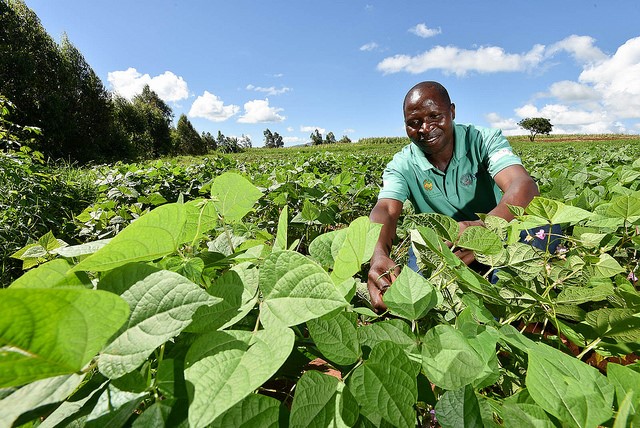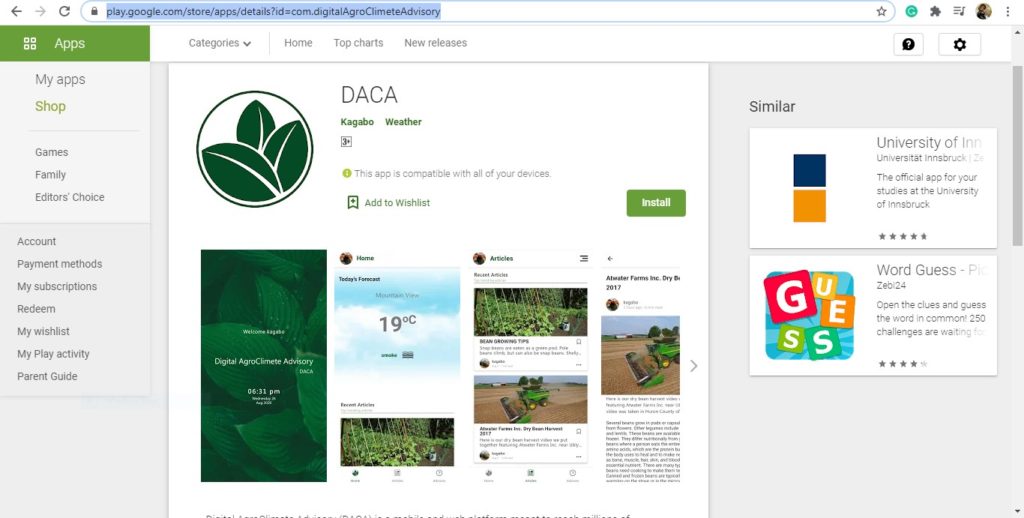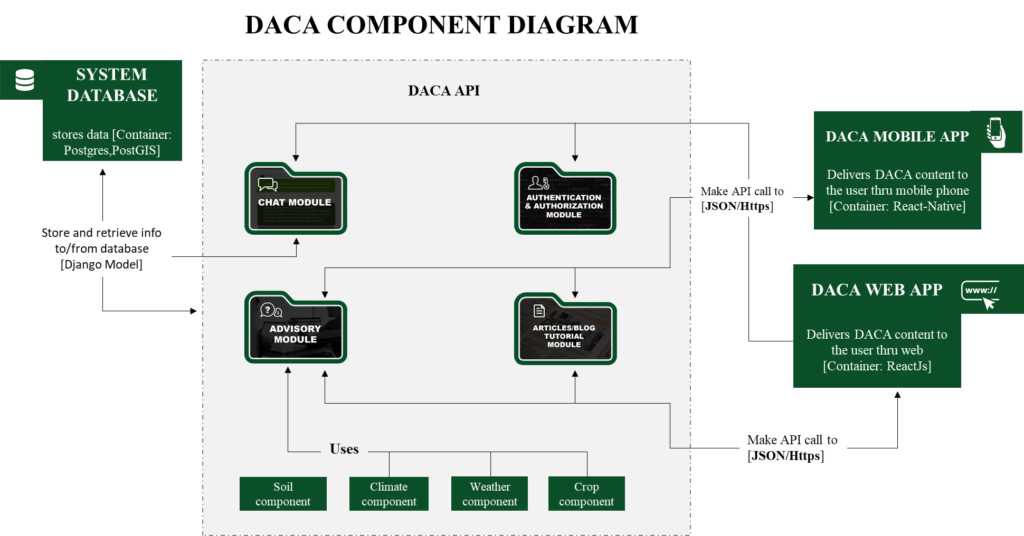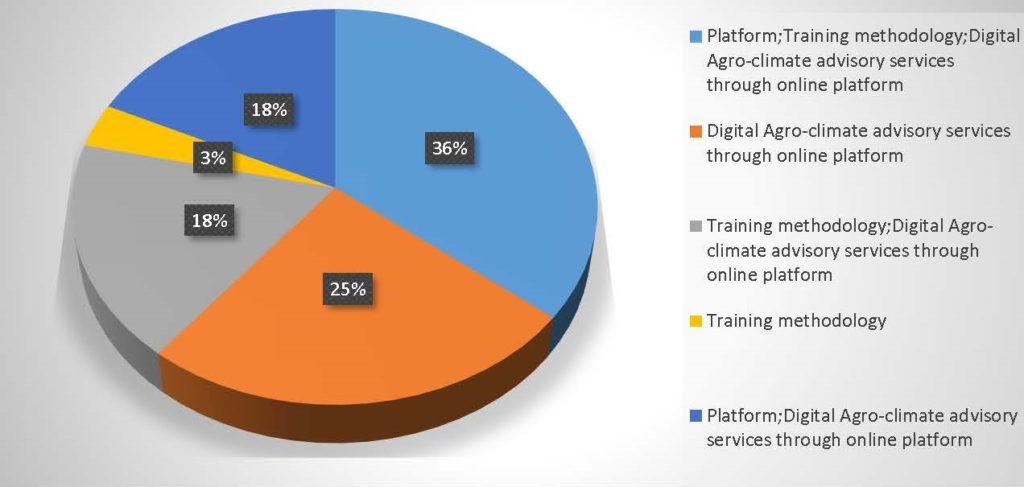By: Desire M. Kagabo, Yvonne U. Munyangeri, Patrick Mvuyibwami, Livingstone Byandaga, Boaz Waswa, Louis Butare, Teshale A. Mamo, Rowland Chirwa, Jean Claude Rubyogo, and Patricia Onyango
“The app is just lovely…. I can easily advise the farmers about DACA without challenges” Participant, Zambia
“I liked the fact that country teams can take part in giving feedback and information specific to their country” Participant, Zimbabwe
Virtual trainings through the Digital AgroClimate Advisory (DACA) was greatly appreciated by trainees as a novel and useful tool in decision making in bean crop production. Participants shared that DACA helped them to expand their understanding of how to make an informed decision and how to guide farmers’ decisions in bean production. Some of the participants expressed this: “[the most interesting part was] the demonstration of the application. It is practical and has a potential in revolutionizing the approach of bean production in terms of decision making as related to climate and weather conditions” … “it has opened our mind to see that there is an opportunity to improve our farmers in decision making in terms of variety selection in this climate change era”.
Access, understanding, and use of agro-climatic advisories have been major gaps for smallholder farmers. Though rain-fed agriculture is the main source of livelihood in sub-Saharan Africa (SSA), climatic challenges have abound, with unpredictably irregular rainfall, intermittent or prolonged dry spells, floods, etc. Solutions to these calamities are still limited especially for vulnerable smallholder farming communities. The timely provision of climate information services is thus a welcome move to address the adaptation and resilience to climatic variability. The information delivered to farmers in a timely way empowers them to prepare for these extreme climatic events.
To improve the resilience of bean farmers, Pan Africa Bean Research Alliance (PABRA) developed a Digital AgroClimate Advisory (DACA)
(https://play.google.com/store/apps/details?id=com.digitalAgroClimeteAdvisory) to help bean farmers manage risks associated with climate shocks that would lead to potential crop failures and post-harvest losses. Furthermore, in the midst of the COVID-19 pandemic with its unprecedented consequences on farmers’ livelihoods, DACA is an alternative to traditional approaches of working with farmers as it contributes to enhancing access to information/knowledge with reduced time, costs, etc.
It is for the above reason that the DACA team organized a virtual training connecting with participants from 10 countries (Figure 1). The training was divided into two sessions with an aim to i)train expert trainers from National Agricultural Research Systems (NARS) on access, understanding, and use of agro-climate advisories who will further train actors in the value chain of bean and support them (actors) to make informed decisions related to production and post-harvest management. Ii) Expose expert trainers on the use of Digital AgroClimate Advisory (DACA).
Participants were drawn from National Agricultural Research Systems (NARSs) in a multidisciplinary context with experience in crop breeding, agronomy, agriculture extension, monitoring and evaluation (M&E), and agro-meteorology. At least six people per country were trained. A total of 72 people were trained with 15 among them women (20.8 %).

Figure 1: Number of countries and participants trained on access, understanding, and use of agro-climate advisories through DACA for improved decision making by bean value chain actors
Learning through Web and Mobile based Digital Agro-Climate Advisory
The DACA is a dynamic digital platform developed to overcome the challenge of data integration that incorporates crops, weather and climate, and soil. (Figure 2).
Through DACA, location, and contextual agro-climate advisories are generated and are available digitally on smartphones to actors of crops’ value chain for informed decision-making. The virtual training included presentations and practical sessions where participants downloaded the DACA app in their mobile phones or tablets and were taken on a step by step process of navigation. to access and understand the information on the app including climate graphs, crop information and agro-advisories.
Impact of COVID 19 on information sharing
The COVID-19 pandemic was a hindrance to face-to-face training. The app provided an avenue to mainly access climate and agriculture-related advisories digitally. Prior to the virtual training, preparations included identifying potential participants, making the necessary equipment i.e reliable internet connectivity, smartphones, tablets, and laptops available so that the participants could take part regardless of location and time zones. . The training was also customized to suit the various country contexts with training manuals delivered through audiovisuals, infographics, text, etc. The topics were on climate and bean information and these were uploaded on the DACA tutorial board.
These manuals were for trainers of trainees and used to gauge the relevance of the content based on feedback presented on the dashboard, participants’ feedback on the content and training were collected. Results showing the feedback from trainees are presented in sections below.
Navigating the DACA app and its products.
The practical sessions of the training included learning how to read, understand and interpret historical climate graphs, probability of exceedance, crop information, matching crops and climate of the location, and applying agro-climatic advisories. Participants were taken through the process of generating and reading climate information presented in a form of probability (exceedance) graphs. Participants were guided on how to record the driest year on the graph, how much rainfall (mm) was recorded, etc. Participants also learned how to determine the probability of occurrence for a particular crop disease for a given seasonal rainfall amount (mm) and come up with several scenarios of rainfall quantities. For example, trainees were asked to determine the probability of bean crop failure when rainfall is below 250 mm per season.
Through online forms, participants shared their feedback and recommendation on the app, the content of the training modules, and the methodology applied. The results are presented in Figure 4.
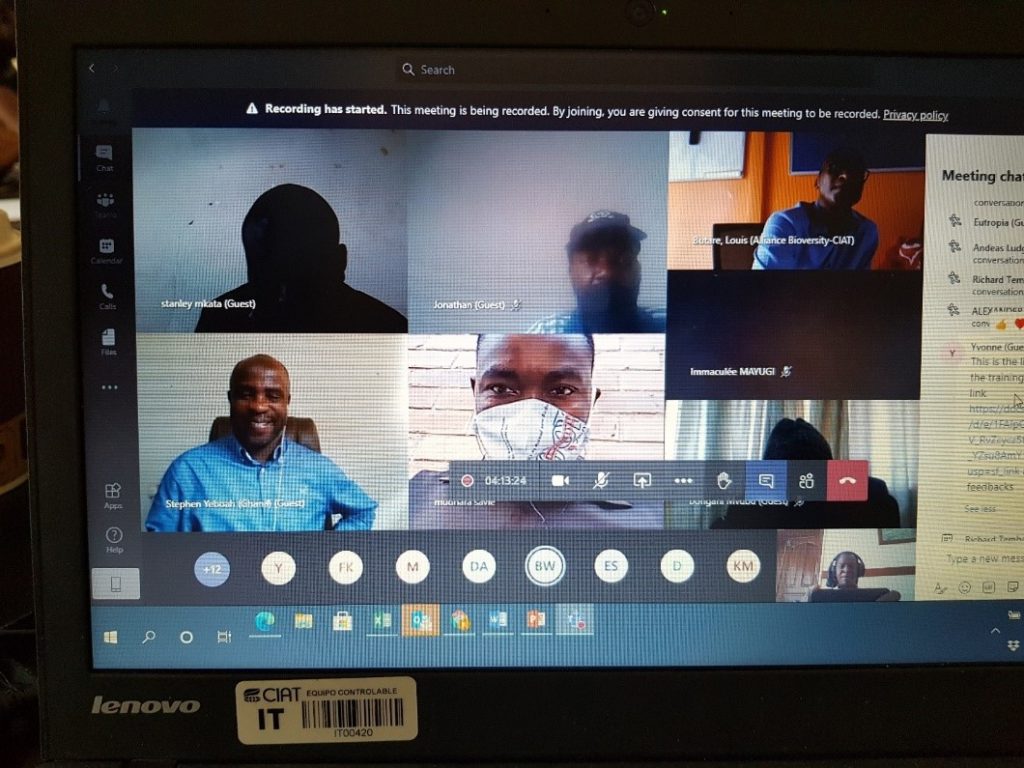
Figure 3. Participants virtually learning on the content of DACA: Understanding and interpreting DACA products
36% of the participants described the training methodology, the platform (DACA), and online agro-climatic advisory services as completely new’ to them (Figure 4).
Additionally, a considerable proportion (25%) found these digital agro-climate advisory services through an online platform as a novel approach to them. Generally, 97 % of responses highlighted that availability of digital agro-climate advisory services through online platforms is new. 72 % of the respondents agreed that the DACA platform was one of the new approaches they discovered during the training. The high proportion of responses regarding the availability of agro-climate advisory services indicated the actual gap in agro-climate services and the need for this kind of service in online platforms. The majority of participants were mostly interested in the calculation of the probability of exceeding and how to relate this with crop water requirement (Figure 5).
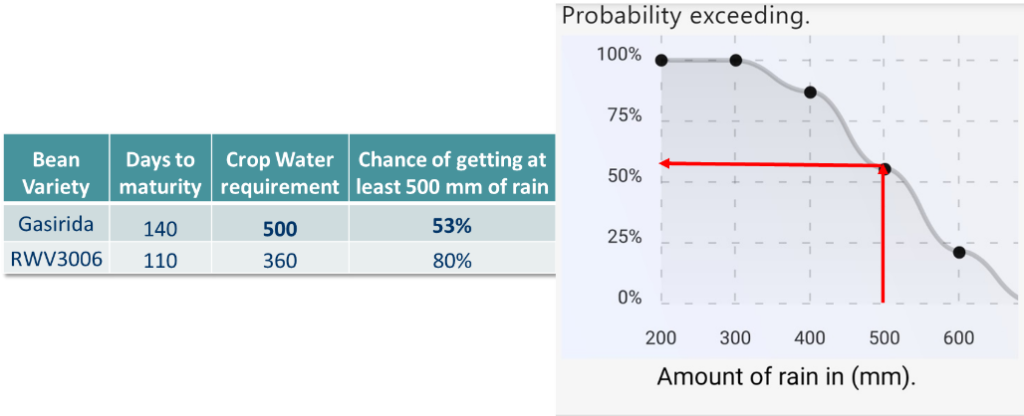
Figure 5: Crop and water relationship, the probability of exceeding a certain threshold of total seasonal rain in mm. Note that numbers in the table are hypothetical for the two bean varieties
They shared that the new knowledge will help them to make the right decisions particularly on the type of varieties to grow.
The most interesting step was the probability of exceeding seasonal rainfall amount… it actually helps to forecast the occurrence of diseases such as blight in beans.”Participant 1, Tanzania
“Variety categorization was the most interesting part because it could inform in cases we have segmented markets for various types of bean varieties” Participant 2, Tanzania
“Relating crop and probability of exceeding were wonderful…For sure, it is a very useful tool to users” Participant, Rwanda.
About the digital platform (DACA), participants appreciated the tool and said it is useful in decision making in bean crop production. Participants said that DACA is a great tool as it helps them to expand their understanding of making climate-informed decisions in bean production. Some of the participants expressed this as follow:
“[the most interesting part was] the demonstration of the DACA. It is very practical and the app has potential in revolutionizing the approach of bean production in terms of decision making as related to climate and weather conditions” Participant 1, Zambia
“It has opened my mind to see that there is an opportunity to improve our farmers in decision making in terms of variety selection in this climate change” Participant 2, Zambia
Participants also found that the DACA platform is another innovative way to support crop and soil management through increased access to climate information. Feedback also showed that participants liked how DACA was explained while others appreciated the fact that users could give feedback on the platform:
“The most interesting part was the DACA online platform. It was well explained and illustrated.” Participant, Eswatini
“Using the application especially to access climate information, managing crop and soil was super!” Participant, Tanzania
This high level of understanding by these multidisciplinary team of participants drawn from NARSs coupled with the digitally accessible tailored weather and climate information services will complement how climate information is integrated into farmers’ activities and assist them to decide on suitable bean varieties to grow and when to start the planting, appropriate bean crop management options, etc. Through DACA’s monitoring, evaluation, and learning board (MEL), the use of climate information services in the 10 countries will be regularly reported to promote interactive learning across the bean value chain actors. This model training that involved 10 countries will be cascaded to the rest of PABRA countries

